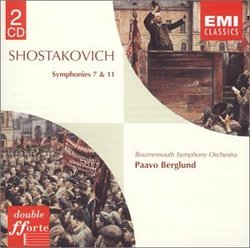| All Artists: Various Title: Shostakovich: Symphonies 7 & 11 Members Wishing: 0 Total Copies: 0 Label: EMI Classics Release Date: 9/12/2000 Album Type: Original recording remastered Genre: Classical Styles: Historical Periods, Modern, 20th, & 21st Century, Symphonies Number of Discs: 2 SwapaCD Credits: 2 UPCs: 724357383929, 724357383950 |
Search - Various :: Shostakovich: Symphonies 7 & 11
 | Various Shostakovich: Symphonies 7 & 11 Genre: Classical
|
Larger Image |
CD DetailsSimilarly Requested CDs
|
CD ReviewsSuperb perfomances of Shostakovich's best. Paul E. Harrison | Stuart, FL | 02/20/2002 (5 out of 5 stars) "Many pieces of music composed in the Soviet Union from 1917 to 1990 have been "reinterpreted" by Western critics in, perhaps, an attempt to reconcile genius with apparent support for a distasteful regime. One example would be Prokofiev's October Cantata, which is regularly branded ironic despite being a highly unironic, deep, and moving piece, largely because its "Revolution" movement is a magnificent piece of dramatic fun.Shostakovich was, like Prokofiev, denounced in the 1930's for producing music that was not joyous and populist enough. He went on to produce some music more to the regime's liking, and plenty that wasn't. There's little sign that he held the Soviet authorities in high esteem. Despite this, perhaps because of the obsession with reinterpreting Soviet-era work, there's much scepticism that he was actually critical of the authorities in his music, even when no other explanation seems possible.The 11th Symphony was written to celebrate the oncoming 40th anniversary of the Glorious 1917 Revolution, and is the story of the earlier 1905 revolution. It comprises of four parts: An atmospheric depiction of the Palace Square where the events took place, a terrifying portrayal of the massacre that happened there (I dare the listener to read a book through the 13th to 15th minute of this CD), a memoriam to the murdered protesters, and a fourth movement that sums up the events emotionally. It's this fourth movement where Shostakovich vents his anger and fury at inhumanity and the evil that men do, not letting the symphony end while there's still more to say.Given the symphony was composed immediately after the crushing of the Hungarian uprising, it's often assumed that the symphony was meant to tell the story of that event, in place of 1905. This seems unlikely, it wouldn't fit the music. But at the same time, it is hard to believe that anyone would vent such anger and rage at an event that occurred over 50 years previous, before he had even been born, and well after the protagonists were dead and buried. And it's even more puzzling that Shostakovich would compose such a negative piece, given the criticism directed at him, when asked to celebrate the revolution, especially after hearing his rather blander twelfth, which does indeed celebrate 1917. Rather, it seems more believable that, because of Hungary, Shostakovich had something to say about power, and evil, and used the events of 1905 as a device through which to speak.These particular performances of both the 11th and 7th symphonies are the best I've personally heard. The performance of the 11th especially is played with the contrasts of softness and terror without ever coming across as boringly dramatic. These are two of Shostakovich's greatest symphonies in one affordable package. This CD set is highly recommended." Two very good performances of Shostakovich! Kenji Fujishima | East Brunswick, NJ USA | 07/10/2004 (5 out of 5 stars) "These are two performances, one very good and one great, of Shostakovich's Seventh and Eleventh Symphonies, two works that usually aren't considered the composer's finest symphonic utterances. Most people consider these works to be shallow and bombastic works, and certainly not the equal of, say, his Fifth, Tenth, or Thirteenth Symphonies. But of course, in a good performance, even less-than-great classical works can sound like masterpieces, and conductor Paavo Berglund and the Bournemouth Symphony Orchestra certainly succeed in making Shostakovich's Eleventh ("The Year 1905") sound like a much more visionary work than it arguably is. Certainly this is an emotionally powerful performance with a compellingly solemn first movement; fiery and tumultuous second movement (particularly the central "massacre" section); deeply moving third movement; and a fourth movement with a touching middle section that feels like a haunting look back at all that has occurred in previous movements. This is the only performance of the Eleventh I have heard, and even if you are not a fan of Shostakovich's Eleventh, this is still quite a performance to hear. The Bournemouth Symphony Orchestra play with passion and power, and Berglund's interpretation is strong and insightful without in any way drawing attention to himself. It has everything to do with the music, and as you listen to it you never get the feeling that Shostakovich is being shortchanged here in favor of histrionics or subjective point-making. Berglund's reading of Shostakovich's Seventh (the infamous "Leningrad") probably stood out more upon its release in 1974, since at that time the work was commonly thought to be merely a crude political potboiler without much artistic merit. All in all, it is a very good performance---it has an exciting first movement (its "invasion" section marvelously done, with an unwritten but highly effective accelerando throughout the many repetitions of the main theme) and a touching third movement (wonderful flute solo in the introduction of its contrasting theme), as well as a notably ambivalent reading of the finale's final peroration (a very un-triumphant-sounding triumph). But of course, Berglund didn't count on Leonard Bernstein to re-record the piece fourteen years later for DG with the Chicago Symphony Orchestra, and furthermore direct a performance so overwhelming in its impact that I don't feel that any other performance can truly compare to it. (Certainly the Bournemouth brass cannot compare to the Chicago brass; the former sounds weak by comparison at times.) That two-disc DG performance of the "Leningrad" is the one I would recommend for first-time listeners.Still, Berglund's Seventh is by no means negligible---for those who know and love the work, it would make a noteworthy alternative to Bernstein's unforgettable account---and his Eleventh is an even better performance. Anyone adventurous enough to purchase this EMI twofer will certainly not feel like they've wasted money." Assured, serious readings, but not in the first rank Santa Fe Listener | Santa Fe, NM USA | 07/30/2006 (4 out of 5 stars) "I was aware of the praise given to these Shostakovich recordings under Berglund, but then I read a comparative review online of the Shostakovich Eleventh. It compared eleven different versions, and tis one form Bournemouth came out on top. So I went back to listen again, my first impression having been of competent, serious, well-drilled readings that can't compete in the first rank. After all, we have the likes of Mravinsky and Kondrashin in both Symphonies, Bernstein in the Seventh, not to mention Gergiev, Temirkaanov, Fedoseyev, and Rozhdestvensky among the Russians still before the public.
I listened, and my opinion remains unchanged. Berglund is a senior conductor who can score a palpable hit now and then. He gets past the junkiness that plagues both scores with dignity. Nothing is extreme, yet nothing swept me off my feet, either. This is British Shostakovich, but even in that category Mark Wigglesworth, a real notable among youngish English conductors, has done more spectacular work, especially in the Seventh, and Bis's sonics are world class." |

 Track Listings (4) - Disc #1
Track Listings (4) - Disc #1








